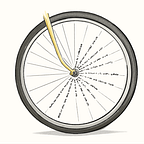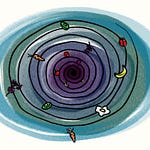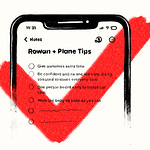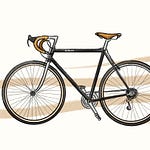👋 Good morning from Los Angeles! I'm Nate Kadlac, and this is #103 of Plan Your Next. A Sunday newsletter that connects design, creativity, and how you prepare for your next thing.
What’s new?
✏️ We’re close to 200 signups for Drawing for Writers: Procreate 101! If you’re curious about the process behind how I draw images like the one below, sign up here. It’s free!
⚡️ RadReads $10K Bootcamp is a free 3-day event hosted by Khe Hy. Right after I left my job last year, I took Khe’s Supercharge Your Productivity course which helped give me some alignment on what was most important to me. This Bootcamp is a free event, where Khe will teach you how to design a system to achieve your goals (while working less). Sign up here.
Imagine you’re out for a bike ride, and something feels off with your front tire. It’s pulling to the left, and you can see it’s not spinning perfectly center. It’s got a slight wobble.
What might you do to fix this?
In a bike shop, a mechanic would flip the bike over and give the wheel a spin to see what the problem is. If the wheel looks wobbly, it can be fixed through the practice of “truing” to make sure the alignment is centered.
Truing a bike wheel is done by spinning a wheel between two metal prongs, looking for inconsistencies between the spoke tension and the wheel itself.
If it has a severe wobble, the wheel will rub up against the metal prongs. It’s up to the mechanic to twist the spokes—either to tighten or loosen them—to bring everything back into harmony. If she’s successful, the wheel would spin seamlessly between the metal prongs in a straight line.
The process of discovering our own interests is like riding a bike with a wobbly wheel.
When you begin to write, you’re veering all over the road, unsure where you’re headed. This is part of the exploration, the adventure of trying to figure out what we’re being drawn to. But because of this adventurous mess, it can drive you mad because you’re not sure what lies ahead.
Can you sustain the momentum? Will people enjoy what you have to say? Will being too adventurous hurt me in the long run?
When a mechanic sits down to true a wheel, each spoke needs to be explored and checked for damage. The same goes for your writing. We can’t know immediately whether to give up on it or not without looking at an idea up close.
Your ideas are like the spokes in a wheel. Each spoke represents an idea that needs to be explored through your curiosity, then either fine-tuned or replaced.
As you write, you’ll begin to notice what excites you, or which ideas need to be thrown out. Maybe an idea feels wobbly, or your knowledge about it feels amateurish, so you’ll need to tweak and spend time with it to find its alignment.
The only way to find alignment is to sit with each idea, write through your curiosities, and see how the road reacts to it. Do you feel like you’re trying too hard to make something work, when really the idea needs to be swapped out for something new, or a slightly different take?
Author James Clear chased his interests all over the field, writing a hundred articles before he truly understood what excited him. He opted for consistency over choosing a particular area to focus on.
"Rome wasn’t built in a day, but they were laying bricks every hour. Just lay a brick. That’s how you build an empire."—James Clear
When I look at many of my favorite writers, I’m drawn to their wheels filled with hundreds of idea spokes. The more successful writers have wheels of harmony, having spent years fine-tuning each spoke, looking for new ways to refine it.
By chasing your ideas through the practice of writing, you’ll eventually hone in on the right wheel of ideas that creatively align with who you are.
⚡️ 2 creative hits for you to check out next
🪄 Unconventional life advice from someone who drinks too much, has just one friend and works a crappy job. My friend Charlie Bleecker wrote a thread this week that went bonkers on Twitter. It’s life advice from her dad, Chaz. It’s hilarious and based on her longer-form essay.
👨💻 A feedback tool for your Twitter threads. Getting feedback on writing Twitter threads has always been a bit difficult. Louie Bacaj built this handy tool to streamline writing feedback, and soon he’ll introduce longer-form essay feedback.
👋 See you next Sunday
If you’ve forgotten who I am, here’s a little bit about me. As always, my calendar is open to chat about your next adventure, crazy idea, or if you’re feeling creatively stuck.
Have a great week,
p.s. If you enjoyed this letter, would you please let me know by tapping on the heart below?













